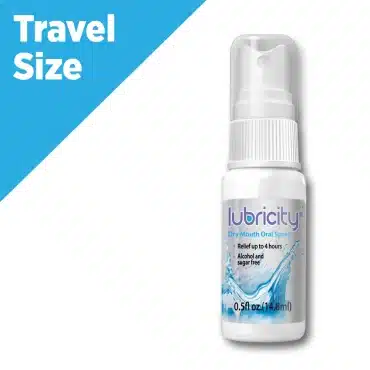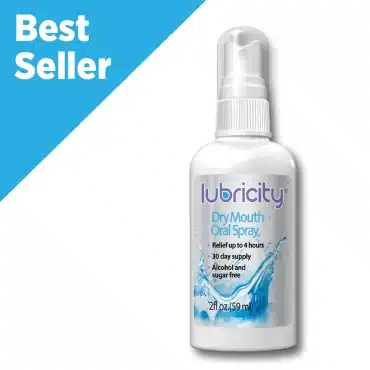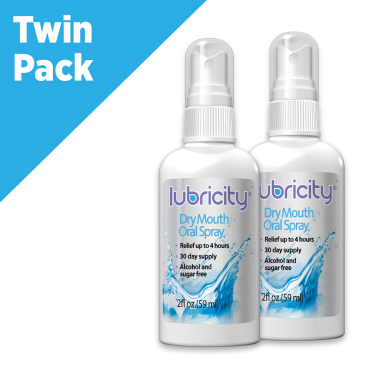Conquering Dry Mouth: The Power of Dry Mouth Spray

Table of Contents
Say goodbye to dry mouth with our expert tips and the effectiveness of a dry mouth spray. Having a dry mouth can affect your whole day. The way you talk, even if you want to be part of a conversation. When you feel like your tongue is swollen and you cannot form the words, your self-esteem creates a wall in your mind and you start becoming more concerned and apprehensive, thinking that you are mispronouncing words or people are noticing that you are talking funny. Dry mouth can be a frustrating and uncomfortable condition to manage, but it’s important to address it for the sake of your oral health. In this blog post, we will delve into what dry mouth is and why saliva plays such an important role in our oral health. We will also explore the possible causes of dry mouth, such as certain medications or underlying medical conditions. Our expert advice will guide you through various strategies for managing dry mouth, choosing the right products, reducing the opportunities for tooth decay, and ensuring that your salivary glands produce enough saliva. Additionally, we will share some natural remedies that may provide temporary relief. Also, by incorporating a dry mouth spray into your daily routine, you can manage dry mouth successfully and enjoy a more comfortable and healthy mouth.
Xerostomia and how it affects oral health?
Dry mouth, also known as xerostomia (Zeer-o-STOE-me-uh), is a condition characterized by insufficient saliva production. This can result in oral health problems like tooth decay and bad breath. Causes include medications, medical conditions, and aging. Effective management involves staying hydrated, avoiding certain foods, and using saliva substitutes.
Understanding the Importance of Saliva for Oral Health
Saliva is crucial for maintaining oral health as it keeps the mouth moist and aids in digestion. It helps wash away food particles, neutralize acids, and prevent tooth decay. Insufficient saliva flow can lead to an increase in bacteria, plaque buildup, and cavities. Proper function of salivary glands is essential for good oral hygiene and your overall health. Understanding the importance of saliva can help individuals better manage and warn off these conditions.
Xerostomia, Symptoms and Why Use a Dry Mouth Spray?
Xerostomia is a widespread condition affecting 1 in 4 people globally and this number goes up to 40% around the age of 55. This means either you or someone you know is experiencing dry mouth symptoms, including a sticky or dry sensation, frequent thirst, bad breath, and difficulty swallowing. Identifying these symptoms is crucial for early detection and management to reduce complications like tooth decay. In fact, individuals with xerostomia are more susceptible to tooth decay, especially if they wear loose acrylic (non-metal) dentures. Saliva helps to create the suction between the gum tissues and the acrylic base of the denture, so a decrease in saliva production can lead to problems with denture fit and function. This is why using a Dry Mouth Spray, 4 times a day and keeping your mouth moist will help with your oral health

Possible Causes
The reasons you feel parched may vary from oral health issues to medications you’re taking. Let’s take a closer look into some of the causes and reasons why dry mouth, also known as xerostomia, occurs. A more understanding of why xerostomia can be happening will provide you with the knowledge to amend the situation. Identifying the root cause is crucial for effective management. These are some of the most common causes of dry mouth, including dehydration.
Medications – Some medications that have side effects causing dry mouth could be Antihistamines like Zyrtec or Benadryl. Overactive bladder medications can also be a culprit like Detrol. Even some heart or blood pressure meds can cause dry mouth like Inderal.
Radiation Therapy – Common treatment that uses high energy beams to kill cancer cells and shrink tumors. There is also proton radiation which may be an option as well. Approximately 60% of most cancer patients choose radiation therapy and more than 80% of people with cancer experience xerostomia after radiation to the head and neck or from certain medicines. Dry mouth happens mainly with this therapy because radiation sucks out most of the moisture in the body. Staying hydrated throughout this treatment is essential.
Sjogren’s Syndrome – One of the most common diseases that has this condition is a chronic inflammatory autoimmune disease which happens predominantly in post-menopausal women. This disease is not gender specific and approximately 3% of Americans suffer Sjogren’s but 90% of these patients are women.
Medications that May Cause Dry Mouth
Certain medications can contribute to xerostomia, also known as dry mouth. Most associated with reduced saliva production are antihistamines, decongestants, and diuretics. Additionally, dry mouth can be caused by antidepressants, anticholinergics, blood pressure medications, and urinary incontinence medications. Another informative blog from GoodRX Health to read more on what medications have xerostomia side effects would be Are your medications to blame? Remember, it is important to inform healthcare providers of any medications that may be contributing to xerostomia symptoms. They may recommend alternative medications or management strategies to correct this side effect.

Underlying Medical Conditions Associated with Xerostomia
Xerostomia can be a symptom of various underlying medical conditions, including dentistry. Sjogren’s syndrome and rheumatoid arthritis, which are autoimmune diseases, are commonly associated with dry mouth. Additionally, conditions such as diabetes, HIV/AIDS, and Parkinson’s disease can lead to reduced saliva production. To alleviate this symptom, it is important to manage the underlying medical condition. Healthcare providers, such as dentists, can offer guidance on managing both the underlying condition and xerostomia.
Strategies to Add Moisture with a Lozenge
Helping to reduce dryness in the oral cavity and manage dry mouth successfully, it is important to drink plenty of water throughout the day. Avoiding caffeine, alcohol, and acidic foods can also reduce discomfort. Stimulating saliva flow can be achieved by chewing sugar-free gum or using sugar-free lozenges. Using a bedroom humidifier can add moisture and can help reduce the parched feeling in the morning. Additionally, regular dental check-ups and practicing good oral hygiene are vital for maintaining oral health. Remember to inform healthcare providers about any medications that may be contributing to dry mouth symptoms for appropriate management. Treat dry lips with Vaseline or some other type of greasy balm, such as lanolin. An air humidifier used in your bedroom at night may help.

Choosing the Right Dry Mouth Spray
There are a variety of products available that can help ease symptoms of xerostomia. Saliva substitutes and artificial saliva provide temporary relief by mimicking natural saliva. Moisturizing gels and dry mouth spray, such as those with the viscosity and feel of saliva, can also help alleviate discomfort. Additionally, using toothpaste and mouthwash specifically formulated for xerostomia can provide added protection against tooth decay. It is important to consult with a healthcare professional or dentist to determine the most suitable products for individual needs. By choosing the right products, individuals can effectively manage and improve their oral health.
Understanding the Role of Lubricity Dry Mouth Spray

The term Lubricity means: The ability of a substance to provide moisture and reduce friction, playing a crucial role in how to manage dry mouth. It helps relieve discomfort and improves oral function. Products with increased lubricity, a product with Hyaluronic acid, a natural lubricant, can diminish the feeling of your tongue being stuck to the roof of your mouth. Understanding the importance of lubricity can help individuals choose the right way to manage dry mouth effectively.
Lubricity Dry Mouth Spray is clinically proven to lubricate/moisten the oral cavity and relieves the discomfort of dry mouth. This product was formulated to act like salvia. Lubricity oral spray was designed to have a thicker texture. The thickness gives it the capability to adhere to the oral cavity. Lubricity dry mouth spray is not an oral rinse that you must spit out making it a convenient option for on-the-go relief. The formula was designed to help retain moisture in your mouth, creating a slick feeling and relieving the symptoms.
Maintaining Oral Hygiene with Less Sugar, Less Caffeine and Mouthwash
Maintaining good oral hygiene is essential for preventing tooth decay in individuals with dry mouths. Brushing gently with a soft-bristle toothbrush at least twice a day is recommended, including before bedtime. Using fluoride toothpaste and mouthwash can provide added protection against cavities. Regular dental check-ups and cleanings are important for detecting and addressing any dental issues. Additionally, avoiding sugary foods and beverages can help reduce the risk of tooth decay. By following these preventive measures, individuals with dry mouth can minimize the chances of tooth decay and maintain good oral health.

Dentist Recommended Dry Mouth Spray and Check Ups
Regular check-ups with a dentist are essential for dry mouth patients to ensure proper oral health care. They help monitor oral health, prevent decay, and ensure early detection and treatment of any oral health issues. Dentists can recommend specific oral hygiene practices tailored to the needs of dry mouth patients, including toothpastes, mouthwashes, and Lubricity dry mouth spray that is specially formulated for dry mouth. These products, which can be recommended by your dentist or doctor, can help increase moisture and stimulate saliva production. Additionally, your health care provider may also prescribe Salagen•, a drug that increases the natural production of saliva. These professional recommendations and treatments can effectively manage dry mouth symptoms and improve overall oral health.
Natural Remedies That Can Hydrate
How to manage dry mouth naturally, there are several remedies you can try. Staying hydrated by drinking enough water helps keep your oral cavity moist. Using a humidifier at night adds moisture to the air and relieves the symptoms. Chewing sugar-free gum or sucking on sugar-free candy stimulates saliva production. Avoiding caffeine, tobacco, and alcohol can also help prevent xerostomia. Additionally, incorporating fruits and vegetables with high water content like watermelon, cucumber, and celery into your diet can help you hydrate.
Consider Acupuncture to Help with Salivary Glands
Acupuncture is an alternative therapy that has been used for a variety of medical conditions, including dry mouth. This therapy involves inserting thin needles into specific points on the body to stimulate energy flow and promote healing. Some studies have suggested that acupuncture can help increase saliva production and relieve the symptoms of dry mouth. If you are considering acupuncture as a treatment option, be sure to consult with a licensed practitioner who has experience in treating dry mouth. They can help determine if this therapy is right for you and create a personalized treatment plan.
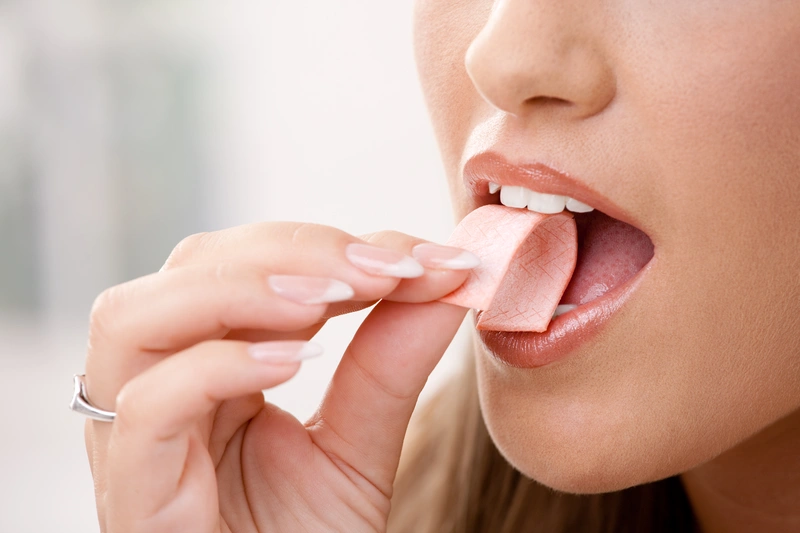
Chewing Sugar-free Gum or using a Humidifier as a Temporary Relief
Chewing sugar-free gum or sucking on sugar-free candy can provide temporary relief for dry mouth, a condition that can cause discomfort, difficulty swallowing, and dental problems. These actions stimulate saliva production, which helps alleviate these symptoms. There are also other remedies for xerostomia, such as staying hydrated, avoiding caffeine and alcohol, using a humidifier, and seeking medical treatment if necessary. It is important to address the underlying causes of dry mouth, such as medication side effects or medical conditions, in order to effectively manage it. Additionally, regular dental check-ups are crucial for preventing dental issues associated with dry mouth.
Using Lubricity Dry Mouth Spray:
The benefits: Lubricity has no alcohol, is sugar and gluten-free that is vegan friendly, and Dentist recommended.
Longer-lasting relief: Lubricity is specifically formulated to provide long-lasting relief. Unlike water, which may only provide temporary relief and quickly evaporate from the oral cavity, Lubricity’s thicker texture allows it to adhere to the oral tissues for a longer period, providing sustained moisture. Lubricity’s long-lasting effect is to moisturize your whole mouth, lasting up to 4 hours per use
Mimicking saliva: One of the key benefits of Lubricity is that it is designed to mimic the natural properties of saliva. Saliva contains enzymes and proteins that help maintain oral health and protect the teeth and gums. Lubricity dry mouth spray is formulated to act like saliva, which can help provide more effective relief from xerostomia symptoms compared to water.
Convenience: Lubricity is an dry mouth spray that you can apply directly to your mouth, and it is designed to adhere to the oral cavity. This means there is no need to rinse or spit it out, making it a convenient option and can fit in your pocket for on-the-go relief.
Clinical validation: Lubricity dry mouth spray is clinically proven to lubricate and moisten the oral cavity and found to be effective in addressing dry mouth symptoms, whereas the effectiveness of water for this purpose may vary from person to person. Clinically proven to be preferred 70% more than their current product.
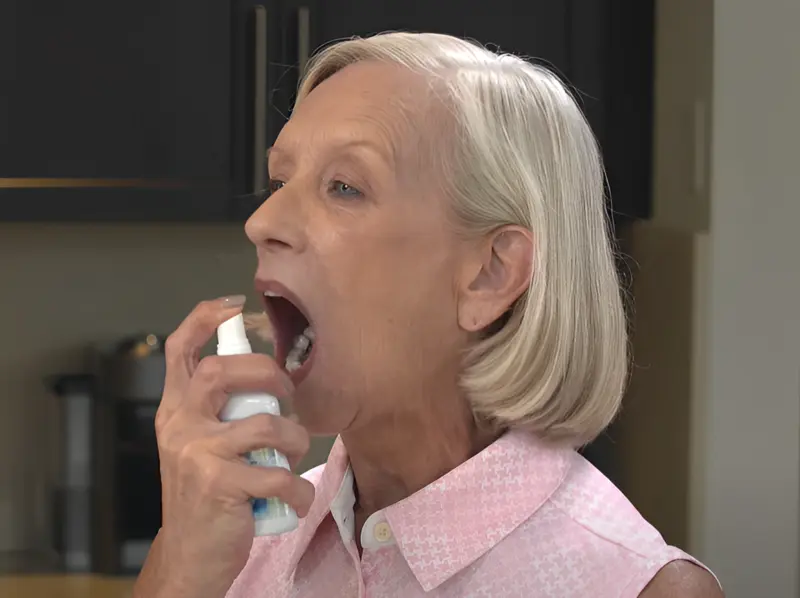
Conclusion using a Dry Mouth Spray
In conclusion, managing dry mouth is crucial for maintaining good oral health and overall well-being. It is important to understand the underlying causes of dry mouth, such as medications or medical conditions, and take appropriate steps to manage it. Using the right products like lubricity can provide relief and reduce tooth decay. Regular oral health check-ups are also essential for dry mouth patients. Additionally, there are natural remedies like chewing sugar-free gum or sucking on candy that can offer temporary relief. If you have any more questions or concerns about managing xerostomia with Lubricity Dry Mouth Spray, don’t hesitate to reach out to our experts for guidance and support. If you need more information on xerostomia you can find out more from the Mayo Clinic. Also, if you would like more information on Sjogren’s Syndrome, see what Sjogren’s Foundation has been doing in research and care.

Lubricity Dry Mouth Spray
Lubricity is a Proud Supporter of the




